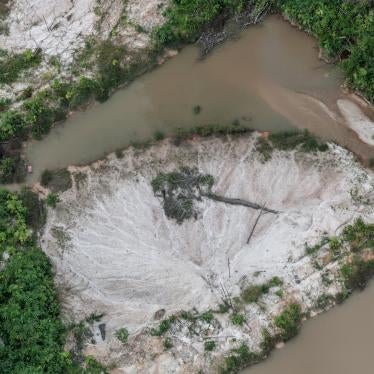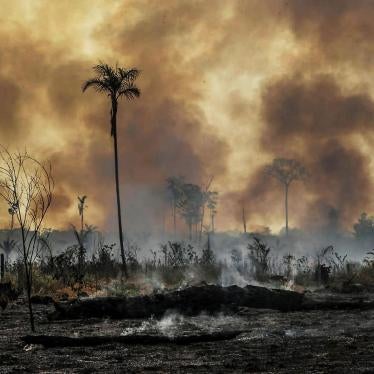Dear Secretary Kerry:
We are writing to share Human Rights Watch’s views on how the United States can best help Brazil halt the destruction of the Amazon rainforest and protect the people who live there.
We are encouraged by President Biden’s commitment to prioritizing the Amazon crisis as part of the US commitment to fight climate change.
The accelerating destruction of the world’s largest rainforest poses a significant threat to climate mitigation efforts. But it is a threat that can be contained, as Brazil demonstrated when it reduced deforestation in the Amazon by 80 percent between 2004 and 2012.
Human Rights Watch has conducted extensive research on the causes and consequences of deforestation in Brazil and the impact—including on human rights—of President Jair Bolsonaro’s environmental policies. We are attaching a briefing paper with our most recent findings and analysis.
The biggest obstacle to saving the Amazon today is the Bolsonaro administration itself. Since taking office in 2019, it has sabotaged the country’s environmental law enforcement agencies, harassed and marginalized civil society organizations, and sought to undermine the rights of Indigenous peoples who play a vital role in forest preservation. These policies have effectively given a green light to violent criminal networks that are driving much of the deforestation, resulting in a dramatic increase in illegal logging and forest fires.
President Bolsonaro has reacted angrily to international concern about the future of the Amazon. He has publicly rejected offers of help, including from President Biden. While members of his cabinet have recently expressed willingness to cooperate with the United States on environmental issues, they have not yet shown they are ready to address the situation in the Amazon with the seriousness of purpose that it requires.
The Biden administration should not be deterred by President Bolsonaro’s intransigence. On the contrary, it should double down on the offer of international funding to help Brazil restore its capacity to uphold its own environmental laws and save its rainforest. At the same time, the administration should maintain strong diplomatic pressure on Bolsonaro, both bilaterally and in multilateral settings, to address the crisis in the Amazon.
We believe this balanced approach could greatly benefit forest conservation efforts within Brazil. To be effective, however, it should be guided by the following considerations.
First, Brazil is more than Bolsonaro. An overwhelming majority of Brazilians—87 percent—believe it is “very important” to save the country’s rainforest according to a recent poll. Many took pride in Brazil’s success in fighting deforestation a decade ago. Many played an active role in making the country a global leader in forest conservation— including environmental groups, Indigenous communities, and business associations— and they are eager to do so again. The Biden administration should engage directly with these diverse stakeholders by seeking their involvement in the design and implementation of any assistance programs.
Among the most important groups to engage are the governors of the nine states that encompass the Brazilian Amazon. Under Brazil’s federalist system, state governments bear much of the responsibility for fighting deforestation, and these governors seem inclined to welcome international support. Indeed, in December, they sent a letter congratulating President-elect Biden on his election, weeks before President Bolsonaro did, and offered to work with Washington in promoting sustainable development in the Amazon. The Biden administration should offer aid directly to their states, in addition to the federal government.
Second, the environmental crisis in the Amazon is also a human rights crisis. Every year, fires set to clear the deforested land poison the air that millions of Brazilians breathe, leading to thousands being hospitalized with respiratory diseases. Brazilians who try to stop the illegal logging and fires—including environmental agents, Indigenous communities, and other local residents—are threatened, attacked, and even killed by the criminal networks that are largely responsible for the rainforest’s destruction.
International efforts to help protect the Amazon should also focus on protecting the people who live there, especially those who are trying to stop the deforestation. If the rainforest is to be saved, those who are defending it themselves need to be protected.
Third, the Amazon crisis persists largely because of impunity. Most of the deforestation in the Brazilian Amazon is illegal, yet the Bolsonaro administration has reduced the number of fines for illegal logging and other environmental law violations, and barely enforced those that have been issued. Likewise, the acts of violence against forest defenders routinely go unpunished. A 2019 Human Rights Watch report documented a systematic failure to properly investigate and prosecute acts of violence linked to illegal logging. Of more than 300 killings linked to conflicts over land and resources in the Amazon in the past decade, only a small fraction has gone to trial.
So long as Brazil’s rainforest mafias face no consequences for their crimes, the destruction of the Amazon will continue unchecked. US assistance should therefore prioritize strengthening the capacity of Brazilian authorities—including federal and state environmental agents, police, and prosecutors—to investigate the mafias’ crimes and ensure that the perpetrators and their accomplices are held accountable.
Fourth, economic development should complement—not replace—improved law enforcement. When confronted with their failure to uphold Brazil’s environmental laws, Bolsonaro administration officials insist that the better way to decrease deforestation in the Amazon is through economic development. Indeed, in our view, the creation of alternative sources of income to deforestation that are lawful and environmentally sustainable could reduce incentives for some people to engage in deforestation, and it may make sense for international support for forest conservation to include assistance for programs that can generate such opportunities.
However, if the Bolsonaro administration is serious about economic development in the Amazon, it will need to get serious about law enforcement there as well. Sustainable development requires the rule of law. And the current state of lawlessness in the Amazon will almost certainly doom the sort of development that officials in the Bolsonaro administration say they seek.
The Biden administration should engage Brazilian authorities at the federal and state levels about how aid could best support economic development in the Amazon. At the same time, it should encourage Bolsonaro administration officials to stop using their professed commitment to economic development as a pretext for tolerating illegal deforestation, violence, and impunity—or, worse, as a cover for policies that benefit the violent criminal mafias who prey upon the rainforest and the people who live there.
Fifth, international funding and support should be conditioned upon results. To ensure that the assistance is being used to achieve the goals for which it is being provided, continued aid should be conditioned upon federal and state authorities achieving, within their respective jurisdictions, significant reductions in rates of deforestation and impunity for environmental crimes and violence against forest defenders. Moreover, this results-based requirement, while focusing on deforestation and impunity, should apply to any aid provided as part of an assistance program whose primary objective is to help Brazil save the Amazon. In this way, elected officials will know that any help financing development projects will depend on the performance of their environmental and law enforcement agencies.
The Biden administration should also indicate that its support for Brazil in other areas of mutual interest will be tied to its performance in addressing the Amazon crisis. One such area of particular relevance is Brazil’s efforts to secure membership in the Organization for Economic Co-operation and Development (OECD), which requires that prospective members demonstrate a commitment inter alia to a democratic society based human rights and the rule of law. President Biden should make clear that demonstrating commitment to human rights requires President Bolsonaro to tackle impunity in the Amazon and join him—and the leaders of a growing number of OECD states—in committing to fight climate change. Concretely, the United States should communicate to President Bolsonaro that the ability of Brazil’s government to achieve substantial reductions in rates of deforestation and impunity will be key to securing US support for Brazil’s accession to the OECD.
Finally, the United States should address its own role in global deforestation. In addition to working with Brazil to save the Amazon, the United States should act to limit its own contribution to forest destruction around the world by limiting US consumption of commodities linked to deforestation. While US imports of illegally-harvested timber are prohibited under the Lacey Act, there are currently no such restrictions for commodities that are often produced on deforested land—such as beef, palm oil, soy, and cocoa. The Biden administration should work with Congress to establish such restrictions, requiring businesses to ensure that they are not importing agricultural products grown on illegally deforested land or from suppliers implicated in human rights violations. And it should ensure that the Lacey Act is being rigorously enforced with regard to timber that is illegally harvested in Brazil or elsewhere.
Ultimately it will be up to Brazil to save its rainforest, but the United States can play a critical role in pressing the country’s leadership to ensure that the many Brazilians committed to this urgent task have the resources, protection, and support they need to succeed.
Sincerely,
Daniel Wilkinson, Environment Director
Maria Laura Canineu, Brazil Director






